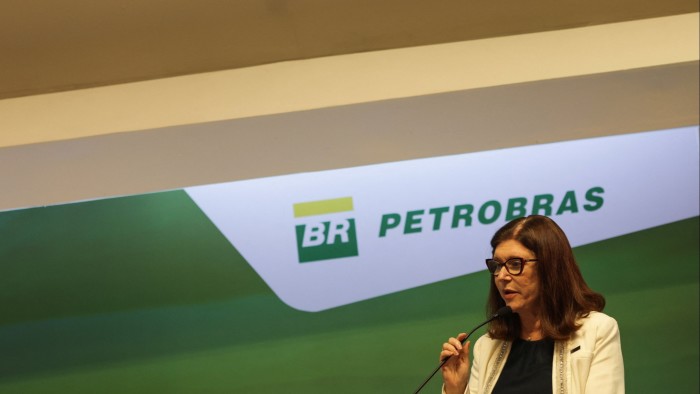Unlock the Editor’s Digest for free
Roula Khalaf, Editor of the FT, selects her favourite stories in this weekly newsletter.
Petrobras needs to be “as big as possible” to guarantee its long-term future, said the head of Brazil’s state-controlled oil major, as the company boosts investments in activities ranging from offshore drilling to biofuels and fertilisers.
Chief executive Magda Chambriard is expanding activities at the $92bn group, reversing a strategy under previous governments that sought to largely leave areas outside deepwater exploration.
The push to enlarge and diversify chimes with the desires of leftist President Luiz Inácio Lula da Silva, who wants the Rio de Janeiro-headquartered group to generate local jobs and stimulate the economy. The company had sold assets such as refineries, petrol stations and onshore fields in recent years to cut debt.
Management raised Petrobras’s five-year capital expenditure budget by 9 per cent to $111bn under a new business plan unveiled last month, which Chambriard said was necessary for the group’s “survival and longevity”.
“When we look at what company we want to be in 2050, we say ‘as big as possible’ and growing at least at the same rate as Brazil,” she said in her first interview with international media since taking the job. “We will grow in oil and generate additional energy, including renewable sources.”
Brazil’s government, which owns 37 per cent of Petrobras equity, but controls just over half of voting rights, appointed her in May.
Chambriard, 67, is continuing a shift that began under her predecessor, Jean Paul Prates, a former senator for Lula’s Workers’ party. He took charge at the start of 2023 with a mandate to turn Petrobras back into a more diversified group with an eye on the energy transition, but was ousted this year.
While oil and gas will remain the primary focus, with exploration and production accounting for 70 per cent of capex in the period up to 2029, Petrobras raised the amount for low-carbon initiatives by two-fifths to $16.3bn. The segment that includes refining, petrochemicals and fertilisers had its pot increased by 17 per cent to nearly $20bn.
“We see a large, vertically integrated company, operating in several segments [and] contributing to a just energy transition,” Chambriard said. “It has to be as big as possible and completely embedded in society in all its aspects, because that is what will guarantee its longevity.”
Chambriard started her career in the energy industry as an engineer at Petrobras and later served as head of the national oil and gas regulator under a previous administration led by Lula’s party.
Prates’s departure followed tensions with Brasília that erupted when the board — the majority of whom the government appointed — defied him and initially withheld extraordinary dividends that were expected by many outside investors.
Lula had publicly criticised the level of shareholder payouts and the pace of investments had frustrated some ministers. The episode sparked fears of a return to damaging government intervention at Petrobras, following mismanagement and a corruption scandal during leftwing rule in the past decade.
Chambriard played down such concerns, saying she had Lula’s backing for a policy that forecasts $45bn-$55bn in ordinary dividends for the next five years, with room for up to $10bn in extra payouts.
“We had no difficulty with President Lula, nor with any minister in justifying ordinary or extraordinary dividends,” she said, adding the payouts would not harm the company’s ability to finance investments. The company’s third-quarter net profit rose 22 per cent to R$32.6bn ($5.4bn).
Investors closely watch the politically sensitive topic of how much Petrobras charges for fuel, given subsidies have cost the company billions of dollars in the past. Chambriard said Lula had accepted her explanation for raising petrol and cooking gas prices shortly after she became chief executive.
Among her top priorities is replenishing the company’s oil reserves, given its crude output is set to peak towards the end of the decade then fall. Petrobras aims to achieve total production of 3.2mn barrels of oil and gas equivalent a day by 2028, from 2.7mn in the third quarter of 2024.
A new element in the strategy is a return to ethanol, a biofuel produced at scale in Brazil from sugarcane and widely used in the country’s car fleet.
The company has allocated $2.2bn for partnerships and has held preliminary talks with about half a dozen companies including Raízen, BP and Inpasa, according to Petrobras executives.
Petrobras is also restarting mothballed fertiliser plants, as Brasília seeks to reduce the dependence on imports. Some analysts have raised concerns that increased investments outside the company’s core areas will lower returns.
But Chambriard has retorted that focusing purely on oil and gas would lead the company to “certainly decline”. She also recently said projects would be done “in a very responsible manner, and with a focus on profitability”.
Read the full article here

